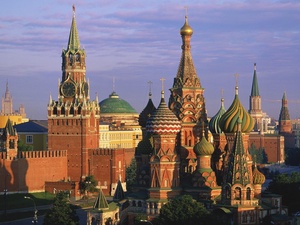
Will the new von der Leyen Commission deliver on climate policy?
Yesterday, during its first plenary session, the newly elected European Parliament confirmed Ursula von der Leyen as President of the European Commis...
News

Publish date: April 26, 2021
News
Speaking at a White House-convened international summit last week, President Vladimir Putin promised that his country, the world’s fourth-biggest emitter, was committed to fulfilling its obligations to fight against climate change.
Putin’s appearance at the virtual gathering via video link signaled a rare moment of common ground between Russia and US president Joe Biden, who said the event showed “that two big nations can co-operate to get something done.”
Biden added that he was “very heartened” by the Putin’s call for collaboration on new technologies such as carbon removal, emphasizing that “nations that work together to invest in a cleaner economy will reap rewards for their citizens.”
“The United States looks forward to looking with Russia and other countries in that endeavor. It has great promise,” Biden said. “This is a moment for all of us to build better economies for our children, our grandchildren.”
The US president’s convening of 40 world leaders, as well as numerous climate experts, and innovators comes as scientists warn the globe must not be allowed to warm past an additional increase of 1.5 degrees Celsius, warning surpassing that surpassing that rise would lead to catastrophe.
Russia has set numerous heat records in recent years, with the first half of 2020 seeing the warmest temperatures since the country began weather observations. The temperature spikes are contributing to increasingly regular and devastating floods and forest fires in Siberia. They also threaten permafrost – the frozen soil accounting for some 60 percent of the country’s landmass – and the infrastructure built upon it, including a vast network of oil and gas pipelines.
But while Putin insisted to the summit that he was “genuinely interested in galvanizing international cooperation so as to look further for effective solutions to climate change as well as to all other vital challenges,” he made no mention of reducing consumption of oil and gas, both massive contributors to rising greenhouse gas levels.
Putin also failed to provide any assurance that Russia would submit a new national plan on cutting carbon – as required this year under the 2015 Paris climate agreement – saying Russia should be given credit for reducing emissions since the end of the Soviet Union and for the absorption capacity of its vast forests.
The US, Canada, Japan and Korea all upped their commitments at the virtual summit, leaving Russia as one of the few countries in the Group of 20 that isn’t aiming for net zero emissions in the next few decades.
Russia’s draft strategy on low-carbon development forecasts annual emissions to remain near current levels by 2050 under the most optimistic scenario. In a state-of-the-nation address delivered last Wednesday, the day before the US summit convened, Putin said Russia’s total net emissions over the next three decades should be lower than the European Union’s.
But that doesn’t necessarily imply a change in policy since annual pollution from the European bloc is currently about 2 and a half times higher.
Russia currently emits about 1.6 billion tons of CO2 equivalent per year, compared to about 4 billion tons for the EU. The base case under the long-term climate strategy set to be adopted in Russia later in 2021 forecasts emissions of nearly 2 billion tons of CO2 equivalent in 2050, though that could be reduced to 1.62 billion tons under a more optimistic scenario. The EU is targeting net zero emissions by mid-century.
Russia’s greenhouse gas emissions have risen strongly in recent years, and its status as one of the world’s biggest fossil fuel suppliers has been bolstered by a deal to supply gas to Germany. That status will be strengthened should the Kremlin’s plans to drill for fossil fuels under the shrinking Arctic ice cap prove successful.
At the summit, Putin estimated that Russian ecosystems have the potential to absorb about 2.5 billion tons of CO2 equivalent per year, although such carbon offsets aren’t currently recognized as part of the Paris Agreement.
Last week, Russian parliament approved a bill that requires major emitters to report their greenhouse gas emissions. But the legislation does not envisage any measures to ensure reductions.

Yesterday, during its first plenary session, the newly elected European Parliament confirmed Ursula von der Leyen as President of the European Commis...

From July 1st, 2024, to December 31st, 2024, Hungary is holding the Presidency of the Council of the European Union (EU), following Belgium’s tenure....

In October 2023, Bellona Europa announced a new FedEx-backed initiative Ports2Decarb – a project aiming to maximise the role of European sea and rive...

Bellona, together with other 29 members of the industrial carbon management community and umbrella organisations, express its support to the inclusio...
Get our latest news